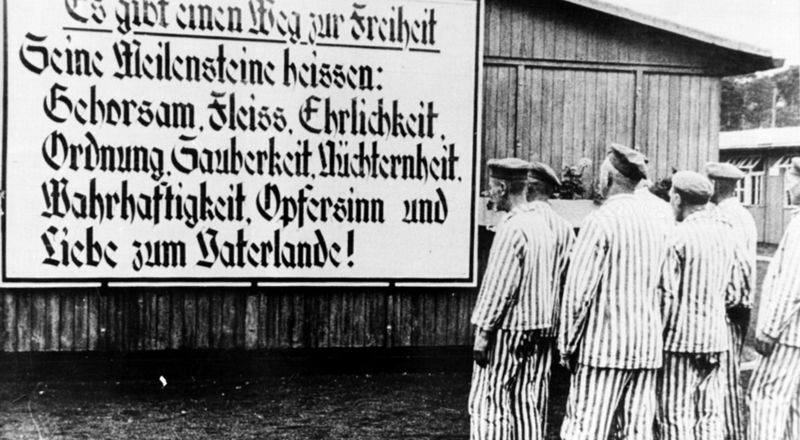Time and the Tides Await Accountability
"The court has come to the conclusion that, contrary to what you claim, you worked in the concentration camp as a guard for about three years.""[In doing so, the defendant had assisted in the Nazis’ terror and murder mechanism].""You willingly supported this mass extermination with your activity. You watched deported people being cruelly tortured and murdered there every day for three years."Presiding Judge Udo Lechtermann, war crimes trial, Brandenberg/Havel"There has been a huge memory work, huge work on what happened in this camp that was almost forgotten.""The important thing here today was that he was proven guilty."Lili Grumbach, granddaughter of Antoine Grumbach, surviving Sachsenhausen prisoner"Even if the defendant will probably not serve the full prison sentence due to his advanced age, the verdict is to be welcomed,.""The thousands of people who worked in the concentration camps kept the murder machinery running.""They were part of the system, so they should take responsibility for it.""It is bitter that the defendant has denied his activities at that time until the end and has shown no remorse."Josef Schuster, head, Central Council of Jews in Germany
 |
"[The sentence] sends a message that if you commit such crimes, even decades later, you might be brought to justice.""And it’s a very important thing because it gives closure to the relatives of the victims.""The fact that these people all of a sudden feel that their loss is being addressed and the suffering of their family who they lost in the camps is being addressed … is a very important thing."Efraim Zuroff, head Nazi hunter, Simon Wiesenthal Center, Jerusalem
It's never too late to repent. On the other hand, repentance in a court of justice is an admission of guilt.
And
so, 101-year-old Josef Schuetz denied guilt and had no need to repent.
He claimed innocence of the charges brought against him, that as an SS
guard during the years 1943 to 1945 he was responsible as an accessory
to annihilation of Europe's Jews, for the deaths of tens of thousands
who passed through the gates of the Sachsenhausen death camp in
Oranienburg.
"I don't know why I am here", he said, since he "did absolutely nothing wrong",
for he had not worked at the camp. He had been an agricultural labourer
in Pasewalk, 115 kilometres northeast of Sachsenhausen. The
Sachsenhausen camp, north of Berlin, was established as the first site
in 1936 in what would eventually become mass incarceration and mass
murder of the Jews of Europe. An experimental site for which Adolf
Hitler had assigned the SS control of what was to become a vast network
of such camps throughout occupied Europe.
 |
| Sachsenhausen, model camp |
There
is no total agreement on the full death count at the camp; some
estimates place it at 100,000, others between 40,000 and 50,000; a
sizeable collected community of Jews meant for annihilation, but in the
overall picture of six million Jewish lives extinguished, a relatively
modest number. The camp's inmates died of various causes: starvation,
disease, forced labour, medical experimentation, shooting, hanging, and
gassing, all to achieve the goal of ridding Europe of its Jews.
Another
101-year-old, a survivor of the death camp, Leon Schwarzbaum left
testimony and a statement that was read posthumously in March, asking
the accused "to tell the historical truth".
Another Holocaust survivor, 80-year-old Antoine Grumbach said as far as
he was concerned the verdict helped to prove that Sachsenhausen was "an experimental extermination camp" which took his father's life.
Germany's antisemitism commissioner, Felix Klein stated that the sentencing of this man was nothing to celebrate since he "lived undisturbed for so long and the indictment came so late".
The trial began in October, suspended on several occasions in view of
Schuetz's ill health. He took part in the trial with his presence for
about two-and-a-half hours every day, held in a gymnasium where Schuetz
lives, in Brandenburg/Havel.
Although his lawyer, Stefan Waterkamp stated that "As early as 1978, investigators had information about him but did not pursue him", the public prosecutor responded that Schuetz had "knowingly and willingly" participated in crimes as a guard; evidence in hand that shared Schuetz's name, date and place of birth. Schuetz "willingly supported this mass extermination with your work", Judge Udo Lechtermann added.
Josef
Schuetz found guilty as an accessory to the murder of over 3,500
prisoners. An accessory to attempted nurder between 1942 and 1945 at
Sachsenhausen camp in Oranienburg. He has made history by becoming the
oldest person to be prosecuted for crimes against humanity in the
Holocaust years. There was no escaping his personal accounting, although
it is a symbolic punishment; his age and health will rescue him from
his penalty after a long life denied his victims.
There
are many more like him who will, in the final analysis, escape
prosecution and the verdict identifying their actions complicit in the
wholesale destruction of six million Jewish lives.
 |
| Prosecutors said that between 1942 and 1945, Schütz served as an SS
guard at the Sachsenhausen camp outside Berlin, where tens of thousands
of prisoners died Associated Press |
Labels: Final Solution, Holocaust, Nazi Germany

<< Home